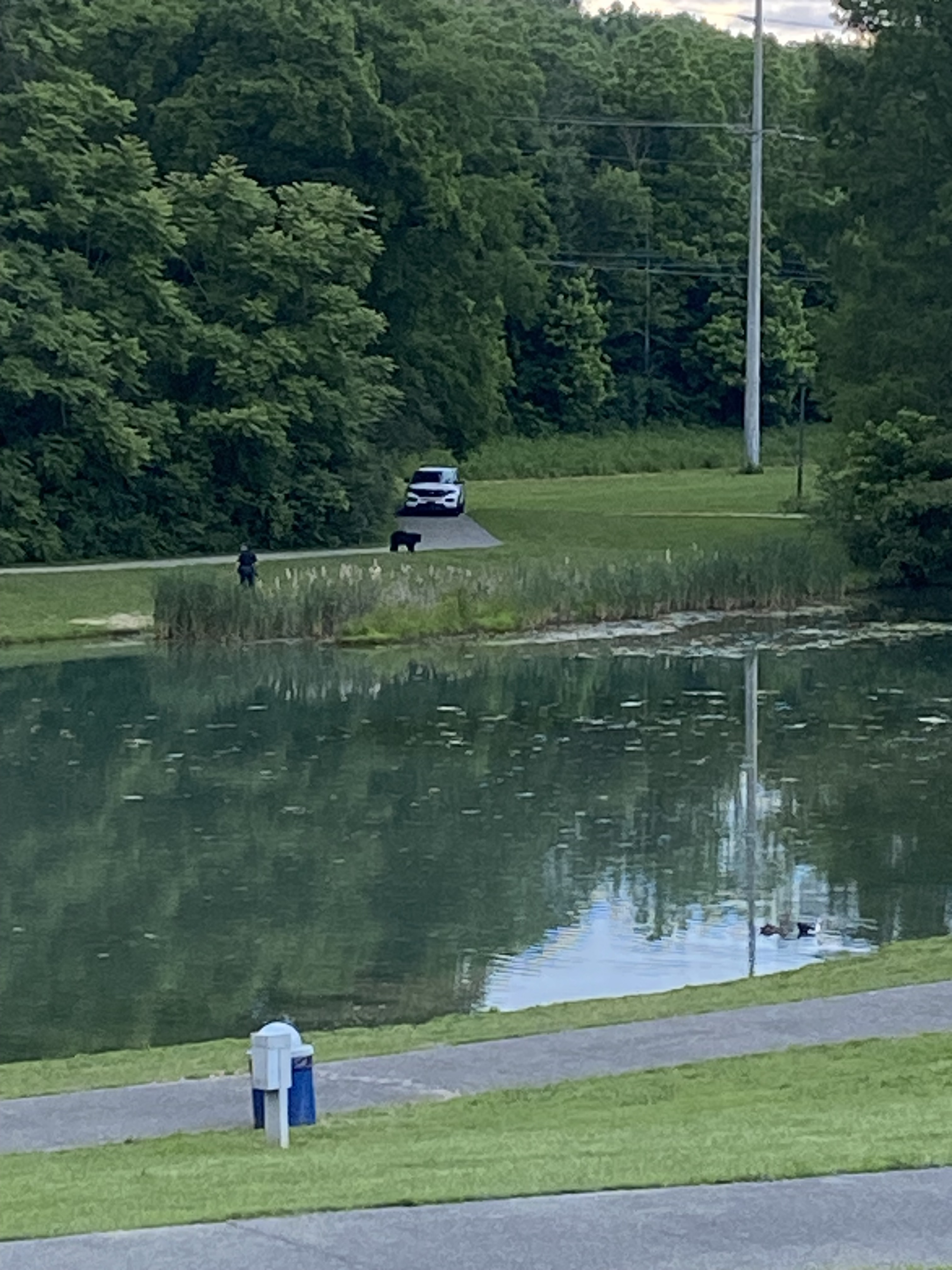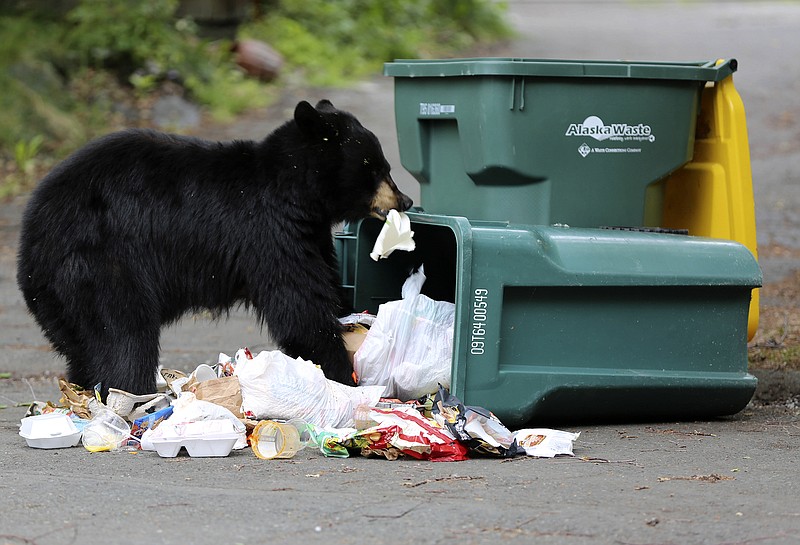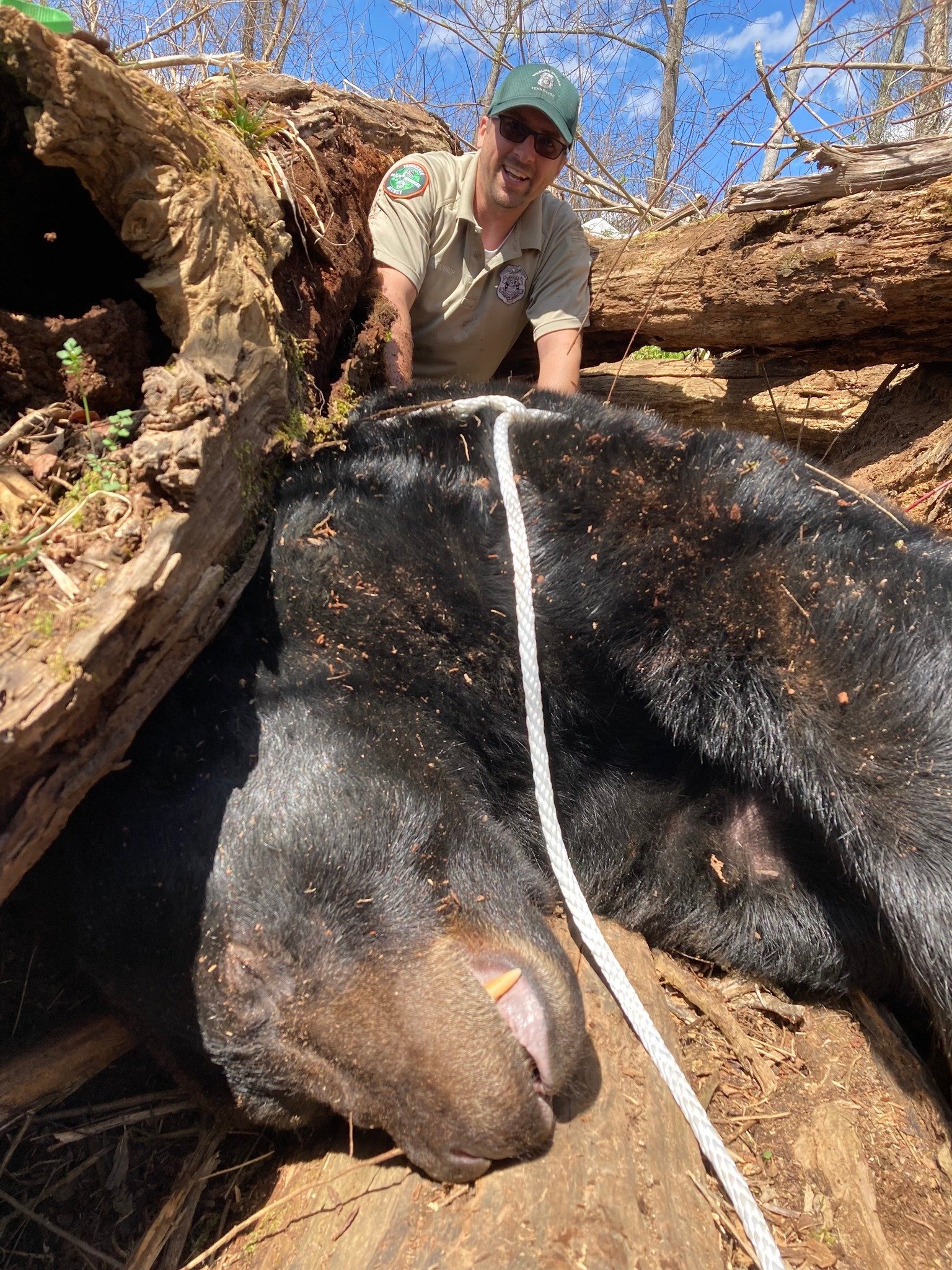After sightings of black bears across the region — including Collegedale and Athens, Tennessee, near the Cherokee National Forest — state wildlife officials are warning Tennesseans to be watchful for wandering young male bears.
This is the time of year mother black bears are pushing their yearling male cubs out on their own, making it more likely they'll run into humans as they seek their own territory, according to Tennessee Wildlife Resources Agency spokeswoman Mime Barnes.
"Black bears are currently being spotted in the Collegedale/Ooltewah area," Barnes said in a news release. They're also appearing in other unlikely places.
A black bear showed up Monday at Athens Regional Park in McMinn County, causing a stir for a few days, according to the police chief.
"We did respond and evacuated the park," Athens Police Chief Fred Schultz said Friday in an email. "It was temporarily closed. But the bear did not return, and there have been sightings around the area in the county."
Athens resident Shanica Jeffries was at the park Monday.
"We went to the park to fish for a little family day," Jeffries said Friday via Facebook's Messenger. "When we arrived, we saw an officer by the pond in his cruiser. A game warden came, and someone told us there was a bear. About five minutes later, it came out of the woods. It later ran across the park to the other side of the woods."
 Contributed Photo / A black bear investigates the lake at Athens Regional Park on Monday as an Athens, Tenn., police officer keeps a watchful eye out. Shanica Jefferies, who took this photo, and her family were at the park for a fun day of fishing when the visiting bear caused the park to shut down.
Contributed Photo / A black bear investigates the lake at Athens Regional Park on Monday as an Athens, Tenn., police officer keeps a watchful eye out. Shanica Jefferies, who took this photo, and her family were at the park for a fun day of fishing when the visiting bear caused the park to shut down.Jeffries, who works in Athens City Schools, was with her husband, a bear hunter, and her two daughters, she said. The family sees black bears often, and they don't necessarily raise an alarm.
"We were not too concerned with the bear being in the area because we know it's just passing through," Jeffries said. "We would have been more concerned if it was actually going after someone, but it wasn't. It was just trying to keep on going. It was a 'wild' day at the park for sure. It probably just wanted some trout."
The park's lake is stocked with rainbow trout once a year for a "fishing derby" for children. This year's event was in late April.
Wildlife officials said sightings increase in late spring and early summer.
"Young bears leave their mothers after the second winter," Barnes said in a follow-up email. "They are in search of food, water, shelter and, eventually, their own territory. They are unaware of the direction they're heading. They travel somewhat aimlessly and often follow their noses toward food sources."
That can lead them to trouble, she said.
"All bears look for an easy meal. Wildlife wants to expend the smallest amount of energy possible in exchange for calories," Barnes said. "Similarly to people, they would prefer a fast-food drive-through over walking for miles, flipping over rocks in search of food. Their fast-food happens to be our trash, bird feeders, outdoor pet food, unpicked garden produce, etc. Most bear issues are tied to human foods/trash, and people can help alleviate these issues by securing or removing these attractants."
(READ MORE: Tennessee is full of animals that can kill you. Here's a guide to staying alive)
The state agency urges people to educate themselves about black bears with resources like bearwise.org, Barnes said.
That website is one of the go-to sites experts point people to for reliable information about black bears and how to deal with them.
No matter how big and furry they look, yearling bears are all trying to figure out how to live without their mother's help, according to BearWise. They are often lonely and lack the fully developed survival skills of an adult bear, and humans can play a positive or negative role.
Like human teenagers, they are at an impressionable stage of life, and if they quickly discover human places should be avoided, they will learn to support themselves as wild bears, according to BearWise. If they find the backyard pickings where humans live are easy, they start down a road that is often a dead end. Literally.
There is a reason for the wildlife officers' mantra, "A fed bear is a dead bear."
Attractants include bird feeders, trash, birdbaths and pet food bowls with leftover food. They can unintentionally lure bears and other unwanted wildlife closer to people, according to wildlife officer Casey Mullen.
Never intentionally feed bears, and look for unintentional food sources around homes, he said. Secure food, garbage, recycling and grills in areas not accessible to bears and other wildlife. Place trash in bearproof containers and place out the morning of pickup.
Alert neighbors to bear activity, and make noise when exiting your home to alert wildlife and provide time for them to move away.
BLACK BEARS
As bear and human populations increase and more people move near public lands and bear-inhabited areas, bear-human interactions are increasing, creating potentially dangerous situations. Prevent safety concerns by following these steps:
— Never feed or approach bears.
— Do not store food, garbage or other recyclables in areas accessible to bears.
— Do not feed birds or other wildlife where bears are active.
— Feed outdoor pets a portion size they will completely consume during each meal and securely store pet foods.
— Keep grills and smokers clean and stored in a secure area when not in use.
— Talk to family and neighbors when bear activity is occurring in your area.
Source: Tennessee Wildlife Resources Agency
IF YOU ENCOUNTER A BLACK BEAR:
In a building, by a trash bin or around the corner:
— Give the bear a clear escape route — do not corner it.
— Leave any doors open as you back away from the bear.
— Do not lock the bear in a room.
IN YOUR BACKYARD:
— From a safe distance, make loud noises, shout or bang pots and pans together to scare away the bear.
— When the bear leaves, remove potential attractants such as garbage, bird seed or pet food.
— Ask neighbors to remove attractants.
— Check your yard for bears before letting out your dog.
IN THE WOODS:
— If you see a bear before it notices you: Stand still, don't approach it and enjoy the moment. Then move away quietly in the opposite direction.
— If you encounter a bear that has become aware of you: Don't run — running may trigger a chase response. Instead, back away slowly in the opposite direction and wait for the bear to leave.
Source: bearwise.org
Contact Ben Benton at bbenton@timesfreepress.com or 423-757-6569.

